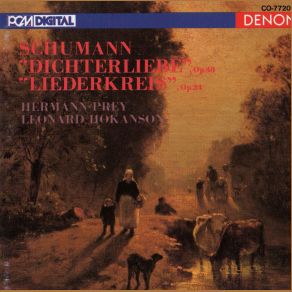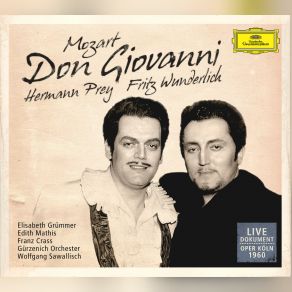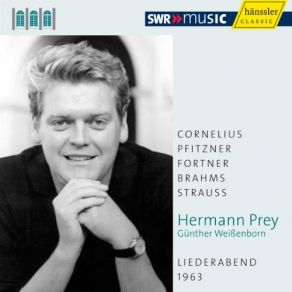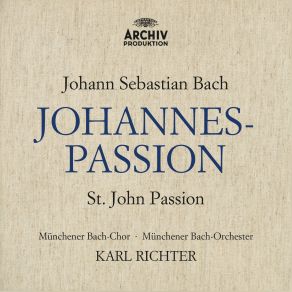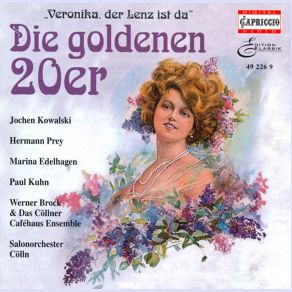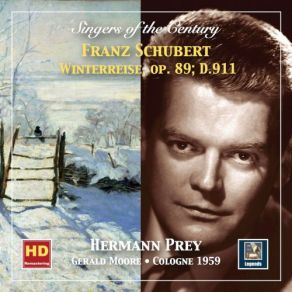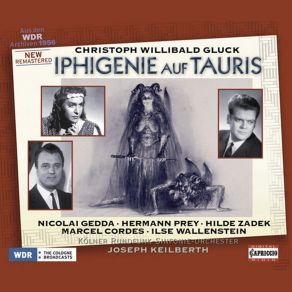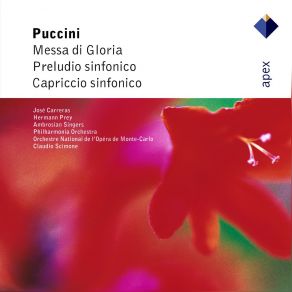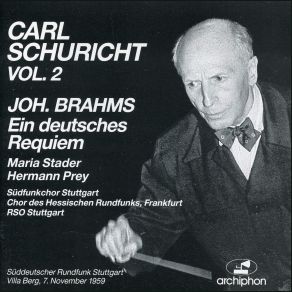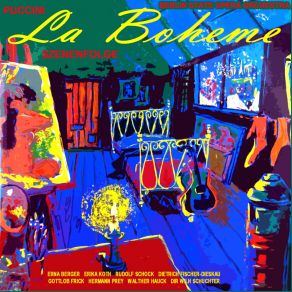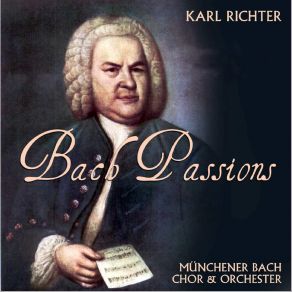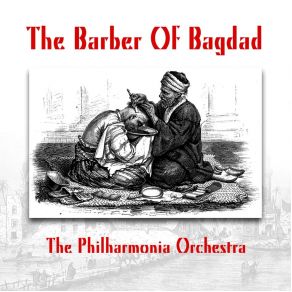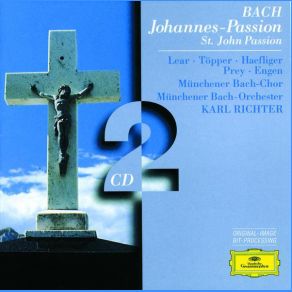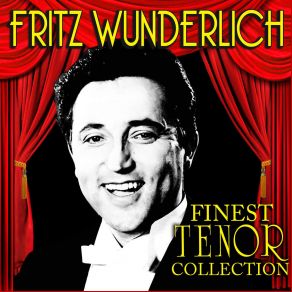Hermann Prey
Wikimp3 information about the music of Hermann Prey. On our website we have 70 albums and 3 collections of artist Hermann Prey. You can find useful information and download songs of this artist.
Biography
[Edit]Hermann Prey was a truly versatile performer — aside from lieder, sacred music, operetta, and opera, toward the end of his career he became a beloved television host and comedian in his native Germany. He was a particularly warm and genial recitalist, and was known for varying his lieder interpretations according to the moods and reactions he picked up from the audience. Such lieder performances were at the core of his work as a singer, although he was also a gifted actor on the opera stage, and was noted for his very human, rather than buffoonish interpretation of Beckmesser in Die Meistersinger. He and Dietrich Fischer-Dieskau were near-contemporaries, sharing almost the same repertoire. Though they rarely sniped at one another in public or threw temper tantrums over the other's publicity (unlike many of their precedents or successors), there was a certain tension between them, which did ease as time progressed, and both were generally acknowledged as different artists who brought different strengths to music, rather than one being a less successful version of the other. He was also a noted teacher, both of singing technique and lieder interpretation.
While his father had no special interest in music, his mother was a music lover, particularly devoted to vocal music. At school, Prey sang in the choir, with occasional solos, and at the age of eleven successfully auditioned for the highly selective Berlin Mozart Choir. The war disrupted all of this, but Prey still sang whenever possible and also played in some amateur bands. After school, he applied to the local music conservatory, and while he was not accepted, the judges recommended that he study with a young teacher, Harry Gottschalk, though Gottschalk was still in college at the time. One of the first tasks was determining whether Prey was a tenor or a baritone, and while his voice did deepen throughout his career, he kept a strong upper register. Gottschalk's teaching focused on vocal exercises and songs, and Prey made enough progress that when he re-auditioned for the conservatory in 1948, he was accepted. At the conservatory he greatly improved his aural training and intonation, and developed a wide repertoire of musical styles, from the medieval to contemporary. Here Prey received his first in-depth introduction to lieder, and it was while he was a student that he decided that 19th century lieder would be the core of his career.
In 1950 he made his first professional concert appearance in a concert at Grunewald Castle, singing the baritone part of Paul Hoffer's Woodland Serenade. During this period, when he was getting as much experience as he could, he also sang a good deal of popular music, and was even urged to become a popular rather than a classical singer. Though his heart remained with lieder and, to a lesser extent, opera, he maintained an interest in popular music, performed and recorded it to some extent throughout his career, and was steadfast in maintaining that a singer need be neither "just classical" or "just popular." Early in 1952, he was expelled from the conservatory for having covertly continued his studies with Gottschalk, whose methods of vocal teaching he preferred to that of the conservatory professors. By that time, however, he had enough experience and exposure as a singer that his career was not particularly affected.
Shortly after this, he won the first prize in the American Army's German youth organization's Mastersinger Competition (out of 3,000 singers who auditioned), which brought him even more publicity, and so many new offers for engagements that unlike most students, he was turning down more offers than he accepted. One of the ones he accepted was for the Hesse State Theater in Wiesbaden, and he made his stage debut as Moruccio in d'Albert's Tiefland. In late 1952, as part of the prize package of the Mastersinger Competition, he made a four-week tour of the United States, where he made his first television appearance on The Ed Sullivan Show, as well as singing in several concerts. Returning to Germany in January of 1953, he auditioned at the Electrola Studios, where he was engaged for several recordings, and in 1954 he made his first recording for EMI, in The Gypsy Baron, as well as singing his first lead role with the Hamburg Opera, Don Carlo in Verdi's La Forza del Destino.
In 1960 he made his Met debut as Wolfram in Tannhauser, and in 1962, he made his Salzburg Festival debut as Gugliemo in Cosi Fan Tutte and recorded Schumann's Dichterliebe for Electrola. In 1963, he made his San Francisco opera debut as Rossini's Figaro. He sang Papageno for the first time in 1964, and it was to become his most popular operatic role; in 1965, he sang Wolfram in his Bayreuth debut.
He first met Fritz Wunderlich in 1959, and they two became very close friends as well as professional associates. In his autobiography (Premierefieber/First Night Fever), in the chapter entitled "Amico Fritz," he described his desolation at Wunderlich's untimely death. He and Wunderlich had recorded an album of Christmas music, which was published about a month after Wunderlich's death. Prey wrote a tribute to Wunderlich on the record sleeve, ending "We were going to take the world by storm. We were to become the Castor and Pollux of song. But fate would have it otherwise. I must remain as the lonely and abandoned twin. I mourn the loss of a friend and brother singer, whom no one can ever replace." Fortunately, they made several recordings and radio broadcasts together, many of which are available on CD.
In 1967, he made his first television show, Schaut Her, Ich's Bin, which became wildly popular. In 1970, made an eight-LP collection of folk songs for Philips, and in 1971 he made a belated debut at the Lyric Opera of Chicago, as Rossini's Figaro. He made a still more belated debut in the same role at Covent Garden in 1973. During the '70s and '80s, he continued to record and present recitals, even adding new roles to his repertoire such as Beckmesser in Die Meistersinger. In 1976, Phonogram released a long-time project of Prey's, a recording of The Prey Lied Edition, a collection of 450 German songs, from Minnesinger compositions to modern works. That same year, he established the Schubertiade Festival at Hohenems, which he directed until 1981, when he and the management disagreed over some of the festival's artistic aims, specifically Prey's wish to present all of Schubert's songs in strict chronological order. He made his directorial debut in 1988 in Salzburg, directing Le Nozze di Figaro. He died unexpectedly in 1993 of heart failure. He and his wife, Barbel, had three children, one of whom, Florian Prey, is himself a singer, whose timbre has some of the same richness of his father's voice.
While he left a number of recordings, unfortunately the Prey Lieder Edition is not currently available on CD. However, EMI released some of his finer Schubert and Brahms recordings in CDZC 68432, and on Intercord Klassische Diskothek he recorded an excellent collection of lieder by Loewe, who was largely overshadowed by Schubert, Schumann, Wolf, and Brahms, but whose music Prey considered greatly underappreciated. In 1988, EMI also released a selection of opera arias (545-CDM), mostly recorded in German. While his rendition of the Toreador Song sounds avuncular rather than swaggering, the other selections, drawn from both his regular repertoire (Die Zauberflaute, Le Nozze di Figaro) and works not associated with his career (Faust, Pique Dame) are excellent.
Artist: Wiener Sängerknaben / Wiener Sangerknaben, Rundfunkchor Berlin, Marjana Lipovšek / Marjana Lipovsek, Dresdner Kreuzchor, Dresdner Philharmonie, Hermann Prey, Rundfunkchor Leipzig, Chorus Viennensis, Bayerisches Staatsorchester, Hans - Joachim Ribbe, Bernarda Fink, Franz Hawlata, Martina Borst, Bo Skovhus, WDR Sinfonieorchester Köln / WDR Sinfonieorchester Koln, Leopold Hager, Stefan Soltesz, Michael - Christfried Winkler, Herbert Lippert, Martin Haselbock, Rundfunk - Sinfonie - Orchester Leipzig, Hungarian State Opera Orchestra, Hans - Joachim Rotzsch, Helmut Wildhaber, Ildiko Raimondi, Sofia Philharmonic Orchestra, Dietrich Knothe, Hungarian State Opera Chorus, Marcus Creed, Stuttgarter Choristen, Bulgarian National Choir, Helmut Froschauer, Rundfunk Sinfonieorchester Berlin, Herbert Kegel, Sofia National Opera Chorus, Sofia National Opera Orchestra, Janos Ferencsik, Georgi Robev, The Soloists, Hanns-Martin Schneidt, Klaus Arp, RIAS Chamber Chorus, Jörg-Peter Weigle / Jorg-Peter Weigle, Martin Flämig / Martin Flamig, Astrid Pilzecker, Bernd Casper, Peter Marschik, Male Section, Leipzig Thomaner Choir, Regina Klepper, South West German Radio Kaiserslautern Orchestra, Cologne Radio Chorus, Peter Falk, Kurt Peter Eichhorn, Roland Büchner / Roland Buchner, Regensburg Cathedral Choir, Hugo Distler Choir, Dorothe Jansen, Berlin Male Choir, Vienna Academy Orchestra, Carl Maria Von Weber Radio Symphony Orchestra, Studentische Madrigalchor Munster, Wolfgang Stahl, Gerhard Mayer, Michael Schoppe, Dieter Fokel, Luxembourg Radio Symphony Orchestra, Friedrich Von Spee Male Choir, Martin Blasius, Sundfunkchor Stuttgart, SWF Radio Orchestra
Genre:
Artist: Neville Marriner, Helmut Winschermann, Wiener Sängerknaben / Wiener Sangerknaben, Max Emanuel Cencic, Dresdner Kreuzchor, Dresdner Philharmonie, Klaus Mertens, Hermann Prey, Monica Groop, Edita Gruberova, Das Kleine Konzert, Rheinische Kantorei, Christoph Pregardien, David Cordier, Capella Savaria, Axel Kohler, Christine Schornsheim, Deutsche Bachsolisten, Concerto Köln / Concerto Koln, Bela Bánfalvi / Bela Banfalvi, Budapest Strings, Ruth Ziesak, Tölzer Knabenchor / Tolzer Knabenchor, Martin Lücker / Martin Lucker, Jochen Kowalski, Stuttgart Radio Symphony Orchestra, Lautten Compagney, Academy Of London, Hannes Kästner / Hannes Kastner, Cologne Radio Orchestra, Hans - Joachim Rotzsch, Marcus Creed, Helmut Froschauer, Gerhard Schmidt-Gaden, Siegfried Pank, Janos Balint, Frank Berger, Hans-Dieter Weber, Studio Orchestra, Studio Ensemble, Deborah Sipkai, Frankfurt Vocal Ensemble, Reinhold Friedrich, RIAS Chamber Chorus, New Berlin Chamber Orchestra, RIAS Symphony Orchestra, Eckart Haupt, Martin Flämig / Martin Flamig, Leipzig Capella Fidicinia, Pal Nemeth, Peter Marschik, Leipzig Thomaner Choir, Cologne Radio Chorus, Peter Dicke, Hermann Max, Wiener Volksoper Orchestra, Roland Büchner / Roland Buchner, Regensburg Cathedral Choir, Rostocker Motet Choir, Hartwig Eschenburg, Ralf Otto, Michael Winkler, Blechbläserensemble / Blechblaserensemble, Charles Humphries, Dietrich Kollmannsperger, Michael Erxleben, Edward H. Tarr
Genre:
Title: Midnight Lounge - Chill Out Classics and Meditation
Artist: Neville Marriner, Hans Vonk, Juliane Banse, Alfredo Kraus, Hermann Prey, Gwyneth Jones, Axel Kohler, Rundfunkchor Leipzig, Mitsuko Shirai, Bela Bánfalvi / Bela Banfalvi, Budapest Strings, Geoffrey Parsons, Jochen Kowalski, Hartmut Höll / Hartmut Holl, WDR Sinfonieorchester Köln / WDR Sinfonieorchester Koln, Das Mozarteum Orchester Salzburg, Stuttgart Radio Symphony Orchestra, The Academy Of St. Martin In The Fields, Rundfunk - Sinfonie - Orchester Leipzig, Cologne West German Radio Chorus, Cologne Radio Orchestra, Philharmonia Orchestra, Wolfram Rieger, Helmut Froschauer, Rundfunk Sinfonieorchester Berlin, Sandor Vegh, Max Pommer, Ernö Sebestyen / Erno Sebestyen, Andreas Juffinger, Andrea Vigh, Janos Balint, Geoffrey Simon, Deborah Sipkai, Berlin Deutsches Symphony Orchestra, Cologne West German Radio Orchestra, Petersen Quartet, RIAS Chamber Chorus, New Berlin Chamber Orchestra, David Shallon, Heinz Geese, Jörg-Peter Weigle / Jorg-Peter Weigle, Kurt Wöss / Kurt Woss, Male Section, Michail Jurowski, Elisabeth Werres, Cologne Radio Chorus, Pinchas Steinberg, Elizabeth Steiner, Armin Fromm, Wernigerode Youth Radio, Friedrich Krell, Moscow Rybin Choir, Christine Pendrill, Evelyn Dubourg, Emmerich Smola, Eclair Salon Orchestra, Michael Erxleben, Edelmiro Arnaltes, Miranda Van Kralingen, Wernigerode Radio Youth Choir, Tabea Zimmermann, Wannsee-Sanger, Thomas Gabrisch, Wladimir Baka, Valerij Rybin, Bratislava Philharmonic Chamber Orchestra
Genre:
Title: Beethoven, L. Van: Lieder, Vol. 2
Artist: Hermann Prey, Leonard Hokanson, Pamela Coburn
Genre:
Title: Schumann: Liederkreis, Op. 39 & 12 Gedichte, Op. 35
Artist: Hermann Prey, Leonard Hokanson
Genre:
Title: Schumann: "Dichterliebe", Op. 48 & "Liederkreis", Op. 24
Artist: Hermann Prey, Leonard Hokanson
Genre:
Title: Mozart Gala: Famous Arias
Artist: Samuel Ramey, Hermann Prey, Marilyn Horne
Title: Voices of Opera: Baritones and Basses
Artist: Ingvar Wixell, José Van Dam / Jose Van Dam, René Pape / Rene Pape, Theo Adam, Robert Lloyd, Tito Gobbi, Hermann Prey, Dietrich Fischer - Dieskau, Simon Keenlyside, Cesare Siepi, Ettore Bastianini, Thomas Allen, Renato Bruson, Kurt Moll, Matti Salminen, Nicolai Ghiaurov, Neal Davies, Simon Estes, Walter Berry, Bryn Terfel, Gerald Finley, Thomas Quasthoff, Trevor Anthony, John Reed, Dmitri Hvorostovsky, Wladimiro Ganzarolli, Matthias Goerne, Hans Hotter, Ludwig Weber, Eberhard Wachter
Genre: Opera
Title: Klabund: Vocal Music
Artist: Hermann Prey, Hannes Wader, Tim Fischer, Rainer Bielfeldt, Hanne Wieder, Sylvia Anders, Studio Orchestra, Ernst Busch, Kate Kühl / Kate Kuhl, Blandine Ebinger, Annemarie Hase, Adolf Fritz Guhl, Katherina Lange, Mikesch Van Grümmer / Mikesch Van Grummer, Daniela Ziegler, Roger Bean Ensemble, Adam Benzwi, Jochen Breuer, Nikolai Orloff, Jurgen Beyer, Eleonore Weisgerber, Dora Dorette, Heinz Bruning, Matthias Günther / Matthias Gunther
Genre:
Title: Don Giovanni
Artist: Hermann Prey, Edith Mathis, Franz Crass, Fritz Wunderlich, Wolfgang Sawallisch, Elisabeth Grümmer / Elisabeth Grummer, Georg Stern, Hildegard Hillebrecht, Hans-Georg Knoblich, Gürzenich-Orchester Kölner Philharmoniker / Gurzenich-Orchester Kolner Philharmoniker
Genre: Classical
Title: Spring Parade
Artist: Wiener Sängerknaben / Wiener Sangerknaben, Wiener Philharmoniker, Hermann Prey, Werner Hollweg, Zoltán Kocsis / Zoltan Kocsis, Bela Bánfalvi / Bela Banfalvi, Budapest Strings, Miklós Perényi / Miklos Perenyi, Jochen Kowalski, London Symphony Orchestra And Chorus, Münchner Rundfunkorchester / Munchner Rundfunkorchester, The Budapest Philharmonic Orchestra, The Vienna Strauss Orchestra, Cologne Radio Orchestra, Thomas Dewald, Christian Hilz, Jeno Jando, Helmut Froschauer, Andras Korodi, Bernhard Schneider, Joseph Francek, Geoffrey Simon, Kurt Redel, Alfred Walter, Werner Brock, Collner Cafehaus Ensemble, Heinz Fricke, Daniel Kirch, Bernhard Husgen, Peter Marschik, Luxembourg Radio Symphony Orchestra, Emmerich Smola, Jana Scharkowskaja, Norbert Neukamp, Wannsee-Sanger
Genre:
Title: Great Singers Live
Artist: Waldemar Kmentt, Heinz Wallberg, Mirella Freni, Hermann Prey, Margaret Price, Nicolai Ghiaurov, Lucia Popp, Wolfgang Sawallisch, Leopold Hager, Münchner Rundfunkorchester / Munchner Rundfunkorchester, Lamberto Gardelli, The Bavarian Radio Chorus, Georges Prêtre / Georges Pretre, Elisabeth Grümmer / Elisabeth Grummer, Hans Altmann, Heinz Fricke, Horst Stein, Werner Schmidt-Boelcke, Argeo Quadri, Kurt Peter Eichhorn, Vladimir Ghiaurov, Alfredo Antonini, Hans Zanotelli, Roberto Abbado
Genre:
Title: Beethoven: Lieder
Artist: Berlin, Hermann Prey, Leonard Hokanson, Pamela Coburn, Wolfgang Matkowitz, Heinrich Schutz Kreis
Genre:
Title: Beethoven: Samtliche Lieder-Complete Songs
Artist: Berlin, Hermann Prey, Leonard Hokanson, Pamela Coburn
Genre:
Title: Beethoven, L. Van: Lieder, Vol. 1
Artist: Berlin, Hermann Prey, Leonard Hokanson, Pamela Coburn, Wolfgang Matkowitz, Heinrich Schutz Kreis
Genre:
Title: Mozart: Opera Gala
Artist: Berlin, Hans Vonk, Natale De Carolis, Nicola Ghiuselev, Kurt Rydl, Hermann Prey, Cecilia Bartoli, Renato Bruson, Staatskapelle Dresden, Josef Protschka, Ruth Ziesak, Sumi Jo, Jochen Kowalski, Münchner Rundfunkorchester / Munchner Rundfunkorchester, Sylvia Greenberg, Marcello Viotti, Hartmut Haenchen, Giuseppe Sabbatini, Bamberg Symphony Chorus, Sofia Symphony Orchestra, Michele Pertusi, Petra-Maria Schnitzer, Wilfried Gahmlich, Claudio Otelli, Sofia Philharmonic Orchestra, Marcus Creed, Sona Ghazarian, Rundfunk Sinfonieorchester Berlin, Radio-Sinfonie-Orchester Frankfurt, Bratislava Philharmonic Orchestra, Berlin Deutsches Symphony Orchestra, Roberto Paternostro, Kurt Wöss / Kurt Woss, Dimiter Dimitrov, Elizabeth Carter, Gertrud Ottenthal, Kurt Peter Eichhorn, NHK Chamber Soloists, Deutsches Symphony Orchestra, Carl Philipp Emanuel Bach Chamber Orchestra, Michael Knapp, Gisella Pasino, Daniela Lojarro, Marco Chingari, Rouslan Raichev, Jeanine Thames
Genre:
Title: Herman Prey: Liederabend 1963
Artist: Strauss, Brahms, Cornelius, Hermann Prey, Weibenborn
Genre:
Title: Carl Schuricht Edition
Artist: Marga Höffgen / Marga Hoffgen, Enrico Mainardi, Elisabeth Schwarzkopf, Maria Stader, Hermann Prey, Otto Wiener, Hertha Töpper / Hertha Topper, Fritz Wunderlich, Clara Haskil, Stuttgart Radio Symphony Orchestra, Barry McDaniel, Ruth Margret Pütz / Ruth Margret Putz, Murray Dickie, Hansheinz Schneeberger, Stuttgart Vocal Ensemble, Carl Schuricht, Stuttgart Bach Choir, Roman Schimmer, Frankfurt Choir Of The Hessian Broadcast, Hermann Josef Dahmen, Edmund Von Michnay, Stuttgarter Lehrergesangsverein
Genre:
Title: Mahler: Symphony No. 8 "Symphony of a Thousand"
Artist: José Van Dam / Jose Van Dam, Agnes Baltsa, Hermann Prey, Rudolf Scholz, Margaret Price, Vienna Boys' Choir, Trudeliese Schmidt, Wiener Staatsopernchor, Wiener Singverein, Leonard Bernstein, Kenneth Riegel, Judith Blegen, Vienna Philharmonic
Genre: Classical
Artist: Wolfgang Schöne / Wolfgang Schone, Hermann Prey, Cecilia Bartoli, Bulgarian Radio Symphony Orchestra, Klára Takács / Klara Takacs, WDR Sinfonieorchester Köln / WDR Sinfonieorchester Koln, The Budapest Philharmonic Orchestra, Hungarian State Opera Orchestra, Giuseppe Sabbatini, Sofia Symphony Orchestra, Boris Hinchev, Claudio Otelli, Sofia Philharmonic Orchestra, Stefka Evstatieva, György Melis / Gyorgy Melis, Rundfunk Sinfonieorchester Berlin, Janos Sandor, Emil Tabakov, Andras Korodi, Vassil Stefanov, Sofia National Opera Chorus, Sofia National Opera Orchestra, Ilona Tokody, Georgi Robev, Giuseppe Patanè / Giuseppe Patane, Roberto Paternostro, Kurt Wöss / Kurt Woss, Andras Mihaly, Gertrud Ottenthal, Pinchas Steinberg, Stoyan Angelov, Bulgarian National Svetoslav Obretenov Choir, Michael Knapp, Rouslan Raichev, Komor Vilmos
Genre:
Title: Hermann Prey - Die Frühen Aufnahmen / Hermann Prey - Die Fruhen Aufnahmen
Artist: Hermann Prey
Genre: Opera
Title: Bach Hermann Prey Baritone
Artist: Hermann Prey, Thomanerchor Leipzig, Kurt Thomas
Genre: Opera
Title: Brahms: Ein Deutsches Requiem
Artist: Milan, Hermann Prey, Agnes Giebel, Sergiu Celibidache, RAI Chorus, RAI Symphony Orchestra
Genre:
Title: Golden 20's (The)
Artist: Paul Kuhn, Hermann Prey, Jochen Kowalski, Werner Brock, Collner Cafehaus Ensemble, Daniel Morgenroth
Genre:
Title: The Golden 20s
Artist: Paul Kuhn, Hermann Prey, Jochen Kowalski, Werner Brock, Collner Cafehaus Ensemble, Daniel Morgenroth
Genre:
Title: Singers Of The Century: Hermann Prey – Winterreise, Op. 89, D. 911
Artist: Hermann Prey
Genre: Classical
Title: Gluck: Iphigenia auf Tauris
Artist: Nicolai Gedda, Hermann Prey, WDR Sinfonieorchester Köln / WDR Sinfonieorchester Koln, Joseph Keilberth, Hilde Zadek, Marcel Cordes, Cologne Radio Chorus, Ilse Wallenstein, Friedrich Himmelmann, Herbert Beil, Claire Breske, Brigitte Kaltwasser, Elly Volkenrath
Genre:
Title: Mahler: Orchestral Songs
Artist: Bernard Haitink, Hermann Prey, Jessye Norman, Janet Baker, James King, Royal Concertgebouw Orchestra
Genre:
Title: Bach: Mass in B minor, BMV 232
Artist: Nicolai Gedda, Hermann Prey, Janet Baker, Franz Crass, Agnes Giebel
Genre:
Title: Lortzing: Zar Und Zimmermann
Artist: Heinz Wallberg, Hermann Prey, Werner Krenn, Chor Des Bayerischen Rundfunks
Genre:
Title: Thomanerchor, Vol. 3 (1959)
Artist: Marga Höffgen / Marga Hoffgen, Theo Adam, Hermann Prey, Gewandhausorchester Leipzig, Agnes Giebel, Peter Fischer, Hannes Kästner / Hannes Kastner, Hans - Joachim Rotzsch, Kurt Thomas, Helmut Weimann, Willy Gerlach, Siegfried Arnold, Heinz Morawietz, Leipzig St. Thomas Choir, Willi Neumann, Franz Genze
Genre: Classical
Title: Die 150 schonsten Volkslieder
Artist: Berlin, Anonymous, Rundfunkchor Berlin, Peter Schreier, Dresdner Kreuzchor, Hermann Prey, Rundfunkchor Leipzig, Hans - Joachim Ribbe, Geoffrey Parsons, Konrad Ragossnig, Hans Lang, Hans - Joachim Rotzsch, Tolz Boys' Choir, Pamela Coburn, Dietrich Knothe, Gerhard Schmidt-Gaden, Studio Ensemble, Jörg-Peter Weigle / Jorg-Peter Weigle, Martin Flämig / Martin Flamig, Male Section, Leipzig Thomaner Choir, Wernigerode Youth Radio, Friedrich Krell, Roland Büchner / Roland Buchner, Regensburg Cathedral Choir, Studentische Madrigalchor Munster, Carl Maria Von Weber Men's Choir, Andreas Wiedermann, Roderich Kreile, Peter Habermann, Wernigerode Radio Youth Choir
Genre:
Collections
Title: The Art Of Gustav Mahler (CD1)
Genre: Classical
Title: Classics For Coffee: Schubert (CD1)
Genre: Classical
Title: Classical Creations: Mahler (CD1)
Genre: Classical
Featuring albums
Title: Beethoven: Fidelio
Artist: Wiener Philharmoniker, Tom Krause, Birgit Nilsson, Kurt Böhme / Kurt Bohme, Lorin Maazel, James McCracken
Genre: Opera
Title: Mozart: Le Nozze Di Figaro (The Marriage of Figaro)
Artist: Staatskapelle Dresden, Otmar Suitner
Genre: Opera
Title: Strauss: Ariadne auf Naxos
Artist: Herbert Von Karajan, Philharmonia Orchestra
Genre: Classical
Title: Goethe and Music, Vol. 2
Artist: Rundfunkchor Berlin, Pamela Coburn, Dietrich Knothe, Rundfunk Sinfonieorchester Berlin, David Shallon, Male Section
Genre:
Title: The Barber of Baghdad
Artist: Nicolai Gedda, Philharmonia Chorus, Philharmonia Orchestra, Erich Leinsdorf
Genre:
Title: Mozart: Cosí fan tutte / Mozart: Cosi fan tutte
Artist: Berliner Philharmoniker, Eugen Jochum
Genre: Opera
Title: Kreutzer: Das Nachtlager In Granada
Artist: Cornelius Hauptmann, Cologne Radio Orchestra, Helmut Froschauer, Cologne Radio Chorus
Genre: Opera
Title: Rossini: Der Barbier von Sevilla (Highlights - Sung in German)
Artist: Staatskapelle Berlin, Otmar Suitner
Genre:
Title: Bach: Cantatas - BWV 51, 59, 243 & Magnificat
Artist: Gewandhausorchester Leipzig, Kurt Thomas
Genre:
Title: Richard Strauss: Capriccio
Artist: Bavarian Radio Symphony Orchestra, Karl Böhm / Karl Bohm
Genre: Opera
Title: Schubert: Alfonso und Estrella, D. 732
Artist: Peter Schreier, Staatskapelle Dresden, Otmar Suitner
Genre:
Artist: Jessye Norman, Tatiana Troyanos, Hans Schmidt-Isserstedt
Genre: Opera
Title: Carlos Kleiber - Complete Recordings on Deutsche Grammophon
Artist: Wiener Philharmoniker, Carlos Kleiber
Genre:
Title: Bach: Mass in B Minor, Mass in F
Artist: Bavarian Radio Symphony Orchestra, Chor Des Bayerischen Rundfunks, Eugen Jochum
Genre:
Title: Strauss: Die Schweigsame Frau
Artist: Wiener Philharmoniker, Wiener Staatsopernchor, Karl Böhm / Karl Bohm
Genre:
Title: Beethoven: 9 Symphonies; Overtures (6 CDs)
Artist: Claudio Abbado, Wiener Philharmoniker
Genre: Classical


